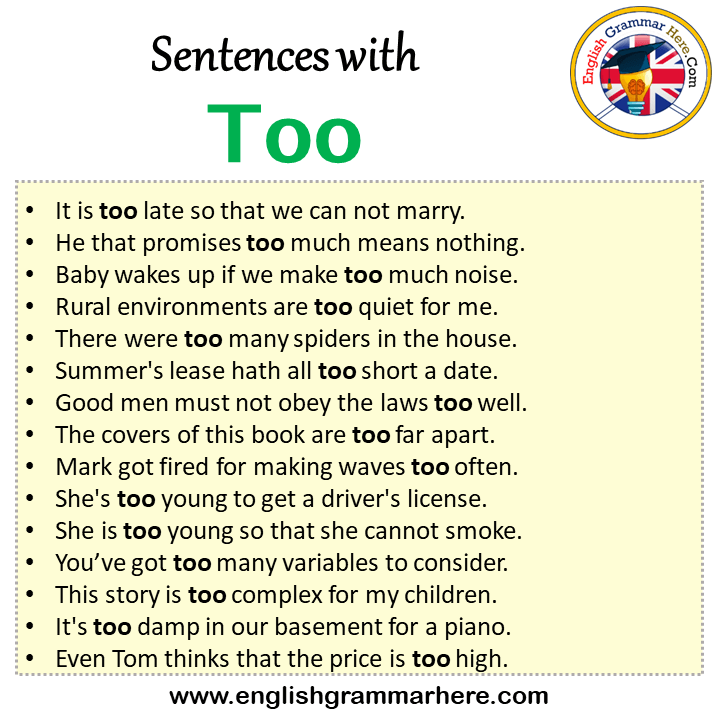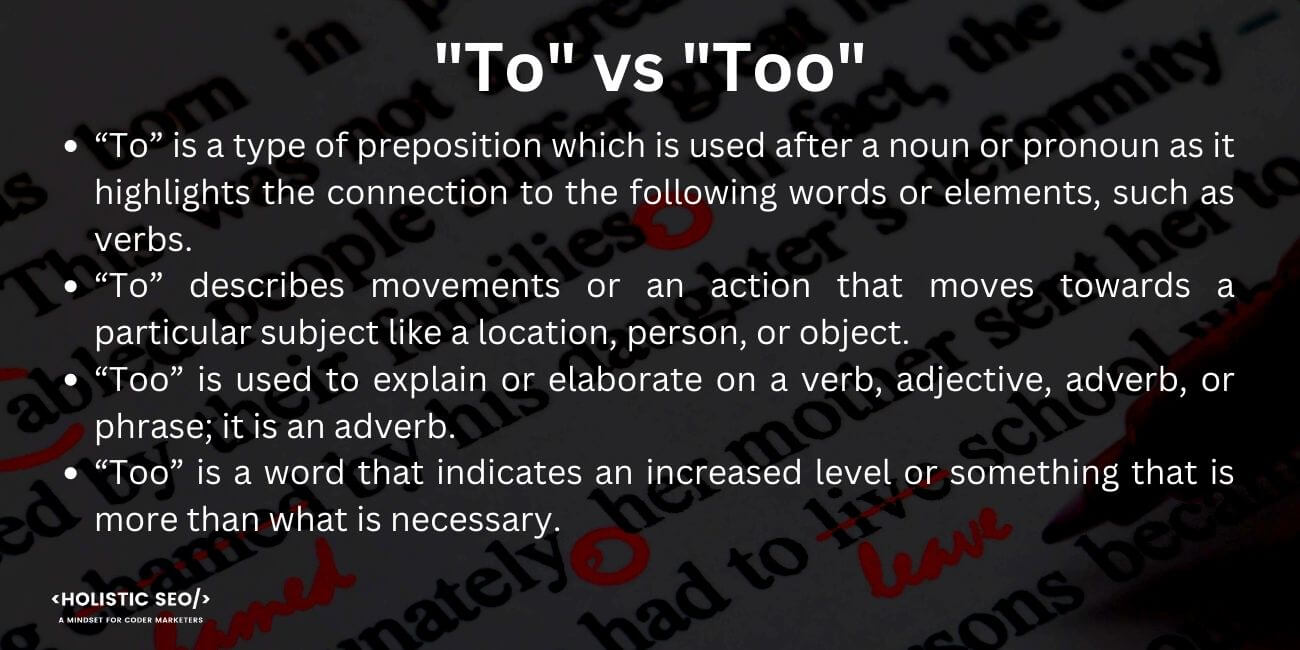Too Turnt Tony - Unpacking A Word's Many Faces
There's a certain kind of energy some folks bring, a real zest for life that just seems to spill over, and you might, you know, find yourself thinking of someone like "Too Turnt Tony." This idea of being "too turnt" captures a feeling of something being, perhaps, a little over the top, or maybe even a bit more than what's quite expected. It's a phrase that, in a way, really gets at the heart of how we use language to describe intensity.
It’s not just about a person's party spirit, though that certainly fits the bill; it's about anything that goes beyond a comfortable boundary. Think of a flavor that's, like, just a little too strong, or a story that gets, you know, a bit much in its telling. This idea of something being "too" much is actually a pretty common thread in how we talk about the world around us.
And that's where things get interesting, because the word "too" itself has a few different jobs in our everyday conversations. We use it to talk about excess, yes, but also to mean "as well" or "in addition." So, basically, getting a handle on this little word can really help clear up some common mix-ups, especially when we consider its sound-alike cousins.
Table of Contents
- Getting to Know Too Turnt Tony - A Linguistic Look
- What Makes Someone Too Turnt Tony?
- The Sound-Alikes - Unpacking "Too Turnt Tony's" Linguistic Quirks
- How Do We Tell "To" and "Too" Apart with Too Turnt Tony?
- Is "Too" Always About Excess, Even for Too Turnt Tony?
- Why Do We Mix Up "To," "Too," and "Two" When Talking About Too Turnt Tony?
- A Quick Guide to Using "Too" Properly - Even for Too Turnt Tony's Antics
- Summary of the Article's Contents
Getting to Know Too Turnt Tony - A Linguistic Look
So, let's just create a persona for our "Too Turnt Tony" to help us make sense of this word. Imagine a character who embodies that idea of going beyond the usual limit. This isn't about a real person, of course, but a way to picture how the word "too" shows up in daily life. He's the kind of character who always, you know, brings an extra layer of something to any situation, whether it's a bit of extra excitement or perhaps a touch of something that pushes the boundaries. His very name, in a way, gives us a perfect example of how language works.
Personal Details - Too Turnt Tony (Fictional Persona)
| Name | Tony "The Turnt" Thompson |
| Defining Characteristic | Known for taking things a step beyond what's usual or expected. |
| Typical Situation | Always adds an extra element, sometimes a little much, sometimes just right. |
| Linguistic Connection | His name perfectly highlights a common language point about excess. |
What Makes Someone Too Turnt Tony?
When we describe someone as "Too Turnt Tony," we're usually pointing out that they've gone, you know, a bit over the top. The word "too" here means something along the lines of "more than what is needed," or perhaps "beyond what is suitable." It's like when you add, say, an extra scoop of sugar to your coffee, and it becomes, well, just a little too sweet. That's the essence of it, really.
It shows that something has reached a point that is, in some respects, past the ideal or comfortable measure. Think of a song that’s played, you know, at a volume that’s just a little too loud for a quiet evening. Or maybe a story that has, you know, just a bit too many details for a quick chat. This sense of excess, of going past the proper amount, is one of the main ways we use the word "too." It's pretty straightforward when you look at it that way.
The Sound-Alikes - Unpacking "Too Turnt Tony's" Linguistic Quirks
Here’s where things can get a little tricky, you know? The English language has these fascinating quirks, and one of them involves words that sound exactly the same when you say them out loud but have completely different meanings and jobs. Our word "too" is a perfect example of this, as it shares its sound with "to" and "two." They are, you know, some of the most familiar instances of what we call words that sound alike.
You might hear someone say, "Tony is going to the party," or "Tony brought two snacks," or "Tony is turnt too." Each sentence uses a word that sounds exactly like the others, yet each one means something quite distinct. It's almost like they're triplets, you know, identical in sound but with very different personalities and roles in a sentence. Keeping them straight can be a bit of a challenge for many people, actually.
How Do We Tell "To" and "Too" Apart with Too Turnt Tony?
So, let's break down the difference between "to" and "too," especially when we're talking about our hypothetical "Too Turnt Tony." The word "to" typically shows direction or purpose. For example, if Tony is headed, you know, in the direction of the dance floor, you'd say, "Tony is going to the dance floor." It's about movement or connection, like saying you're giving something "to" someone. It's a word that points the way, in a sense.
On the other hand, "too" has a couple of different jobs, as we've talked about. One way we use it is to mean "also" or "in addition." So, if Tony is having a good time, and his friend is having a good time, you might say, "His friend is having fun too." This means his friend is also having fun, just like Tony. It's a way to add something extra, you know, to what's already been said.
The other main way "too" works is to show that something is, you know, beyond a desirable point, which is exactly how we get the phrase "too turnt Tony." If the music is, say, at a level that's more than what's comfortable, you'd say, "The music is too loud." It's pointing to an excessive degree, something that goes past what's fitting or right for the moment. It's a pretty powerful little word, actually.
Is "Too" Always About Excess, Even for Too Turnt Tony?
That's a good question, and the answer is, you know, not always. While "too" certainly often means "more than enough" or "excessive," it also has that other meaning of "also" or "besides." Think about it this way: if "Too Turnt Tony" arrives at a gathering, and his friend shows up, you could say, "His friend came along too." Here, "too" simply means "as well," not that his friend is excessively present.
You often see "too" used at the very end of a sentence when it means "also." It's a way to add an opinion or a piece of information that supports or extends what was just said, or what someone else mentioned. For instance, if someone says, "That was a great party," you might respond, "I thought so too." It's a simple way to agree or to, you know, include yourself in the sentiment. So, it's not always about going overboard, even if Tony himself tends to.
Why Do We Mix Up "To," "Too," and "Two" When Talking About Too Turnt Tony?
It's pretty common for people to get these three words mixed up, and it's mostly because, you know, they sound exactly alike when spoken. Our brains process sounds very quickly, and sometimes the spelling doesn't quite catch up to the sound. When you're writing quickly, it's easy to just pick the wrong one because your ear tells you they're the same. This happens, actually, more often than you might think.
Consider "two," which refers to the number 2. It’s pretty straightforward, you know, when you think about it. But the other two words, "to" and "too," can be a little more challenging because their meanings are a bit more abstract than a simple count. This is why, you know, spelling errors involving "too" are quite common in writing. It's a classic example of how words that sound identical can cause a bit of a headache for writers.
So, when someone is trying to describe something about "Too Turnt Tony," they might accidentally write "Tony went to the party too" when they mean "Tony went to the party, also." Or they might write "Tony had two much fun" instead of "Tony had too much fun." These small slips happen, you know, all the time, simply because our ears don't distinguish between the spellings.
A Quick Guide to Using "Too" Properly - Even for Too Turnt Tony's Antics
To help keep these words straight, even when thinking about our lively "Too Turnt Tony," here’s a simple way to remember. If you can replace the word with "also" or "as well," then "too" with the double 'o' is the one you want. For example, "Tony is dancing, and I am dancing too." You could say, "I am dancing as well," and it still makes sense. That's a pretty good test, you know.
If you're talking about direction or purpose, like heading somewhere or giving something to someone, then "to" is the word you need. "Tony went to the store." You wouldn't say "Tony went also the store," would you? That, you know, just doesn't sound right. This one is about pointing the way, or connecting things, in a manner of speaking.
And if you're talking about the number that comes after one, then "two" is always the correct choice. "Tony brought two friends." There's no mistaking that, you know, for the other words. It's a straightforward count. So, basically, by remembering these simple rules, you can avoid many common mix-ups, even when describing something like the energetic spirit of "Too Turnt Tony."
When "too" means "excessive," like in "Too Turnt Tony," you can often replace it with phrases like "very" or "extremely" to see if it fits the meaning. If you say, "Tony is very turnt," it captures that sense of intensity, you know. This usage of "too" always implies a degree that goes beyond what's considered normal or appropriate. It's about reaching a point that is, you know, perhaps a bit much.
So, if you're ever unsure while writing, just pause for a moment and, you know, try swapping the word with one of its alternatives. If "also" works, use "too." If it's about direction, use "to." And if it's a number, it's always "two." This little check can really help you make sure your writing is clear and precise, which is, you know, what we all want in the end.
This article explored the many uses of the word "too," especially in the context of the phrase "Too Turnt Tony." It looked at how "too" can mean "excessive" or "more than enough," as well as "also" or "in addition." The piece also covered the common confusion with its sound-alike companions, "to" and "two," explaining their distinct meanings and roles in sentences. It provided ways to tell these words apart, making sure the right word is used for the right situation.

Sentences with Too, Too in a Sentence in English, Sentences For Too

Hyphen vs Dash: Difference between Them and How to correctly use them

VERY, TOO, ENOUGH general gramma…: English ESL worksheets pdf & doc